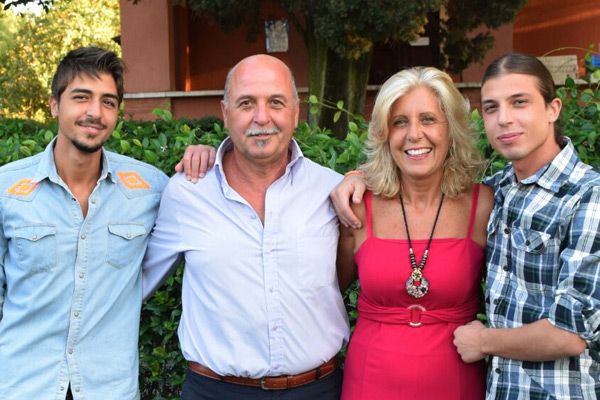 Menu
Menu

“My original idea was to create a cookbook for our hungry students, a ‘food for thoughts’ manual, if you will,” said Silvia De Simone, Eugene Constantin Campus business office manager, of her Due Santi Cookbook: A Taste of UD Rome. “Time spent on the Rome campus does not only involve studying; it involves getting to know a new culture and widening your horizons.”
De Simone explained that she wanted to share Italian culture through food, introducing students to recipes that it would be easy for them to make themselves while also giving them the historical backgrounds of the recipes and suggested wine pairings. The project has since evolved into a wider effort: a means of raising money for the Rome Expansion and Renewal Campaign.
The cookbook is largely based on the recipes found in a traditional Italian cookbook that De Simone’s mother gave her when De Simone moved from her hometown of Naples to Rome.
“I used my mother’s cookbook as my main point of reference, because it contains recipes from traditional Italian cuisine,” said De Simone. “Another reason is because my mother wrote a dedication to me on the cookbook’s first page which, in turn, I wish to dedicate to all those who are going to prepare these recipes: ‘Whatever you will do in your life, do with that wonderful enthusiasm that distinguishes you. It will be the joy of all those people who have the chance to meet you, and especially of those you love.’”
With the exception of a few Greek dishes, the cookbook mostly consists of traditional Italian recipes, a celebration of Italy’s strong culinary identity and its distinctive regional traditions. De Simone used three criteria to select the recipes she would include: 1) they must be traditional; 2) they must be easy to prepare; and 3) they should reflect the different types of cuisine — Roman, Italian and Greek — that Romers encounter during their semester abroad.
“Most of the recipes are served regularly on the Rome campus or during the students’ trips,” said De Simone. “By exploring different meals and occasions, the cookbook offers a glimpse of our campus life. We would be very proud if, when cooking for your friends, family or colleagues, you choose to impress them by using our recipes!”
As far as her favorite recipes go, De Simone explained that she has very personal ideas about food. In whatever dish she’s making, she tries to combine the different flavors in a way that achieves a balance of taste.
“For example, if I cook spaghetti with tomato, basil, toasted pine nuts and pecorino cheese, I want to be able to taste the aromatic flavor of basil and the sweet-sour and savory taste of tomato (which reminds me of Naples), combined with the intensity of the toasted pine nuts and the sharp, salty-flavored taste of the pecorino cheese,” said De Simone. “There is no need to add anything else to these basic ingredients except extra-virgin olive oil and salt. So, I would say that my favorite recipes are the ones where taste is enhanced and not covered by too many condiments, spices or sauces.”
She also appreciates recipes that take her back to a particular event, place or atmosphere.
“I will never forget that day when my husband and I were in the Archipelago of La Maddalena in Sardinia on a boat with a group of friends, and one of them cooked spaghetti with bottarga (a type of Italian caviar) and figs,” said De Simone. “Every time I cook that dish, I remember the good time we had, the laughter and that incredible landscape of charming little islands, the turquoise sea and the beautiful sunset.”
De Simone explained that American Italian food is very different from traditional Italian cooking, since Italian immigrants had to adapt their home country recipes to the new country when they first came here. Therefore, to taste authentic Italian cuisine, one must either travel to Italy or learn to prepare it in their own kitchen.
“We know very well that our cookbook is only a small manual among millions of more professional cookbooks,” said De Simone. “However, what makes it so special is that it refers to the experiences of hundreds of students, who represent the present and the future of our world. We really hope that, with our daily work here on the Rome campus, we contribute to their education and that, with this cookbook, we contribute to the joy of everybody’s palate.”
Donors who gift $1,000 or more to the Rome Expansion and Renewal Campaign will receive their own copy of the Due Santi Cookbook: A Taste of UD Rome. Prepare and enjoy your own gli spaghetti alla carbonara from right out of the Due Santi Cookbook.